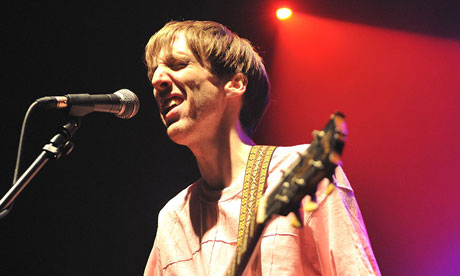
Ten days ago a concert-goer at the Cedar Cultural Centre in Minneapolis made the mistake of shouting out a sarcastic request for the Knack's 1979 hit My Sharona towards the end of a show by Georgia indie-rocker Bradford Cox's Atlas Sound project. For his sins he was rewarded with a dissonant, hour-long, "death trance" version during which Cox free-associated spoken-word lyrics about "the death of folk music, the passing of time, and the ends of our lives", invited the heckler to remove his clothes, and repeatedly shouted: "This is what happens when you make requests." Some fans fled the venue, aghast. One reviewer fretted: "Atlas Sound at the Cedar was unforgettable, definitely, but it's disappointing that it was for strange reasons."
By the sound of it, the only disappointing thing about Sharonagate is that anybody would be disappointed by it. It was an apparently "shocking" concert in an era one might think was beyond shock. Suicide's notorious, riot-inducingly antagonistic 1978 concert in Brussels seems as distant as the premiere of The Rite of Spring. When My Bloody Valentine first performed You Made Me Realise as a 20-minute maelstrom of noise, audiences were traumatised; by their 2008 reunion shows it had become the main reason to show up. With concert revenues increasingly expected to make up for lost record sales, there's enormous economic pressure on musicians to cuddle up to their fans, perform those classic albums in full, justify the expense of a babysitter – in short, play nice. You could attend 1,000 shows and at least 999 performers would give people the songs they paid to hear. As Nicky Wire of the Manic Street Preachers, not exempting his own band from the complaint, sighed recently: "I miss the total disregard for an audience."
Before he began his ascent of Mount Sharona, Cox mockingly told the heckler: "I am a performer. I must play what you want to hear," and the show offered an unexpected reminder that there is still a difference between art and entertainment. When online discussions polarised between those who considered it a regrettable meltdown and those who thought it the stuff of legend, Cox responded: "If it's frightening to people, then those people seriously need to look at the mediocrity they subscribe to." He also had complaints about the online world: "The saddest thing is that nothing can happen for an audience of 400 people any more. Now it has to be on the internet and it has to be broadcast so widely ... It makes people more self-censoring."
It also seems to make people more reactionary when it comes to any gesture of refusal. When Bon Iver's Justin Vernon declined to sign up to one of the Grammys' reliably feeble on-stage collaborations this year, Gawker headlined its report: "Bon Iver Turn Down Grammys in Favour of Whining", while Slate called him "insufferable" for passing up a potential "sales boost". God forbid an indie-rock performer snub an institution as crass and dull as the Grammys. Give-the-people-what-they-want realpolitik is now so established that the merest peep of stroppy artistic integrity gets slapped down with snark.
Just as Pseuds Corner in Private Eye often can't tell the difference between gassy posturing and intelligent writing, the overwhelming suspicion of anybody who takes an artistic stand is depressing conservatism masquerading as clear-sighted populism. I grew up with the idea that artists were meant to be opinionated and adversarial and that art was invigorated by conflict. As Pet Shop Boy Neil Tennant once wrote in a bracing essay on the power of hatred: "I retain the old-fashioned belief that pop music is meant to be a challenge to society as well as an affirmation of it. And so I consider it my duty to hate things … to hate a lot of things is tantamount to really caring about others."
I suspect Jonathan Franzen would sign up to Tennant's manifesto. Last week he nettled the internet by declaring that "Twitter stands for everything I oppose … It's hard to cite facts or create an argument in 140 characters." Indignant tweeters predictably responded with their equivalent of UN sanctions – the sarcastic hashtag game – which perhaps wasn't the best way to rebut Franzen's critique. I love Twitter but I'd be amazed if Franzen did. On the contrary, I cherish his cranky, get-off-my-lawn valorisation of "serious readers" (ebooks also get short shrift) and I'm only disappointed that he doesn't write by candlelight with quill and parchment. If James Patterson took up cudgels against people who bought paperbacks in airports, I might be taken aback, but literary novelists aren't just permitted to be a little snotty: they should be positively encouraged.
It is de rigueur to accuse anyone with a contentious opinion of "trolling", reducing them to the level of a comment-thread pest, but Franzen, Cox and Vernon aren't being glibly obnoxious to get a rise out of people. They are drawing lines in the sand, making clear what they value and what they hate, and without those lines any artform will degenerate into consensual slop. As the pressure grows on creative people to be genial, unpretentious populists who answer every request with a cheerful yes, I'm increasingly fond of those cussed individuals who reply instead with a loud, belligerent no.

